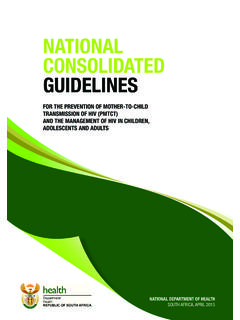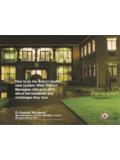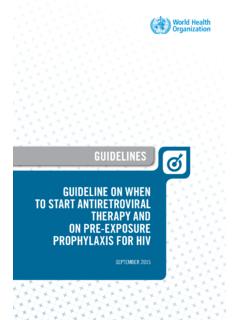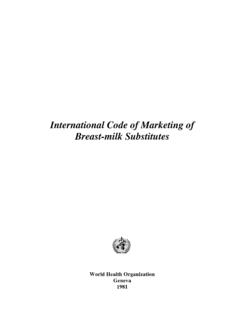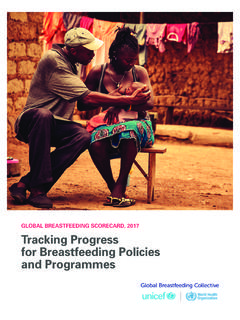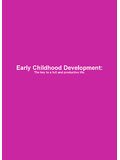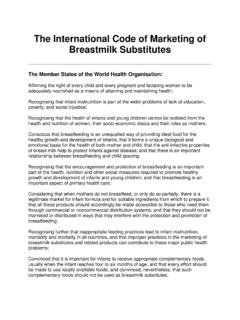Transcription of Infant Feeding in the context of HIV in South Africa
1 Infant Feeding in the context of HIV in South AfricaProduced by the Yezingane Network and UNICEF December 2010, updated July 2011 Questions and AnswersIf the mother is HIV-positive should she exclusively breastfeed? How can HIV transmission through breast milk be avoided?Exclusive breastfeeding means giving a baby no other food or drink not even water except breast milk. It does, however, allow the Infant to receive drops and syrups (vitamins, minerals and medicines) if needed. (WHO)What is the best way to feed a baby?1. A few examples of complimentary foods are raw fruits, vegetables, protein (meat, milk, cheese, beans) and carbohydrates (potatoes, rice, porridge).23 Exclusive breastfeeding for the first six months is the most beneficial way to feed all babies; if the mother is HIV-negative she should ideally continue breastfeeding until the baby is two years old, or longer according to the mother s wishes, with complementary foods added from six months.
2 If the mother is HIV-positive, breastfeeding should be accompanied by antiretroviral treatment for the mother or prophylaxis (daily nevirapine) for the baby. When HIV-positive mothers stop breastfeeding, they should do so gradually over a period of one month. From the age of six months breast milk alone is no longer sufficient to meet a baby s nutritional needs. Age-appropriate, safe and nutritionally adequate complementary foods and liquids should, therefore, be given in addition to breast milk1. When the baby is between the ages of 6-8 months, complementary foods should initially be given 2-3 times a These guidelines are from the National Department of Health Clinical Guidelines for PMTCT (Prevention of Mother-to-Child Transmission) 2010ii and the National Department of Health Infant and Young Child Feeding breastfeeding contributes to building healthy babies and children, and ensures that babies do not get sick as it strengthens their immune system and protects them against death from illnesses such as diarrhoea and These benefits are true even in areas where HIV is a common problem, and even though breast milk carries HIV and can transmit HIV.
3 The section below explains why HIV positive mothers should Recent evidence shows that mothers who are HIV-positive should exclusively breastfeed because of the many health and survival benefits to babies, so long as the mother or baby receives antiretroviral treatment or prophylaxis. We now know that there is reduced risk of HIV transmission through breastfeeding if antiretroviral treatment or prophylaxis is used by either the mother or baby. Research has also shown that when HIV-positive mothers exclusively breastfeed rather than using mixed Feeding (which is a combination of breast milk and formula Feeding ); there is much less transmission of HIV. Exclusively breastfed babies whose mothers are HIV-positive thrive and benefit, as do all babies, from the many nutritional benefits of breast milk. They are also at less risk than mixed-fed babies of developing and possibly dying from diarrhoea and evidence shows that if a mother or baby is on antiretroviral treatment or prophylaxis throughout the period of breastfeeding, the chances of HIV transmission to the baby through breastmilk is significantly reduced.
4 The likelihood of HIV transmission increases when there are higher viral loads in the blood or breast milk, antiretroviral treatment or prophylaxis decreases the viral loads in the blood and breast milk. This significantly reduces the likelihood of mother-to-child-transmission of a breastfeeding mother who is HIV-positive or her baby be on antiretroviral treatment?What is the South African Government s guidelines on HIV and breastfeeding?Note: In light of WHO 2009 recommendations and the South Africa context , there needs to be further clarity in policy/guidelines about when breastfeeding should be stopped for HIV-positive In order to significantly reduce the chances of HIV being transmitted to the baby, either the mother or the baby should be on antiretroviral treatment (for mother) or prophylaxis (for baby). If a mother is already on lifelong antiretroviral treatment (ART) she must continue taking the treatment as normal throughout the breastfeeding period.
5 In addition, the baby must receive antiretroviral prophylaxis daily for six weeks after birth. If the mother s CD4 count is above 350 she will probably not be on antiretroviral treatment (ART). She then has two options. Either: 1. She must go on to antiretroviral prophylaxis for as long as she breastfeeds, and for one week after breastfeeding stops. Or, 2. The baby must get antiretroviral prophylaxis throughout the breastfeeding period, and for one week after breastfeeding stops. The second option (daily nevirapine prophylaxis for breastfeeding babies until one week after breastfeeding stops) is part of the current South African PMTCT 2010 the Government adopted a new strategy (as part of the revised PMTCT guidelines) which encourages exclusive breastfeeding for all HIV-exposed babies until six months old. The new guidelines state that: All babies with mothers who are HIV-positive must receive antiretroviral prophylaxis daily for six weeks after birth, and If the HIV-positive mother is not on lifelong antiretroviral treatment and the baby is breastfeeding, then the baby must be given antiretroviral prophylaxis (PMTCT regime Infant component daily nevirapine), throughout the breastfeeding period, up until one week after breastfeeding stops.
6 If the HIV-positive mother is definitely not breastfeeding and will never breastfeed then the daily antiretroviral prophylaxis (nevirapine) can be stopped six weeks after delivery All women who are HIV-negative, of unknown HIV status, and/or have HIV-positive infants should be advised to exclusively breastfeed their babies for the first six months of life and to continue breastfeeding with complimentary foods up to at least two years. This treatment is available, free of charge, from government clinics and are the benefits of exclusive breastfeeding for the BABY?iv ..and for the MOTHER?- what are the missed benefits?Not Exclusively Breastfeeding - what are the risks? 67 Breast milk contains important antibodies which strengthen the baby s immune system, leading to optimal growth, development and health. Breast milk reduces the chances of babies dying from common childhood illnesses such as diarrhoea or pneumonia, and leads to quicker recovery during illness.
7 Exclusive breastfeeding protects the baby s stomach lining (intestinal mucosa) making it an effective barrier to infections. Breast milk is the best food for babies as it gives them all the nutrients they need and reduces the risk of malnutrition. Breast milk is readily available, affordable and safe, which helps to ensure that infants get adequate sustenance. Breastfeeding promotes a vital bond between mother and child, which is important even if a mother may be returning to work. Breastfeeding reduces risks of breast and ovarian cancer later in life. Breastfeeding promotes a vital bond between mother and child. Breast milk is always available, reducing possible difficulties in accessing supplies. Exclusive breastfeeding can reduce the chances of early conception (though it should not be used as a contraceptive method), reducing the risks associated with having children too close together. Breastfeeding helps women return to their pre-pregnancy weight faster, and lowers rates of a mother chooses to exclusively formula feed her baby or to use a combination of breast milk and formula (mixed Feeding ), possible risks for the baby include: Formula Feeding is linked to higher risks of illness for the baby, such as water-borne diseases like diarrhoea.
8 These arise from mixing powdered formula with unsafe water and not sterilizing bottles and teats properly. A baby who is not breastfed in the first six months is 14 times more likely to die than a baby breastfed exclusively for six Malnutrition can result from over-diluting formula to stretch supplies. Malnutrition leads to illness and in many cases this leads to stunted growth rates. Mixed Feeding can increase the risk of HIV transmission. If breastfeeding is not done regularly the breast milk may dry up. A study in Botswana (which is a middle income country like South Africa ) looked at baby deaths from diarrhoea and malnutrition, and showed there were higher survival rates among HIV-positive babies who were breastfed. The study also revealed that of six-month-old babies who were breastfed died from pneumonia and diarrhoea, whereas 33% of babies who only had Infant formula (no breast milk) died from pneumonia and diarrhoeavi. Research shows that babies who are not exclusively breastfed for six months miss out on a number of important benefits.
9 In particular, breast milk contains antibodies that support the baby s immune system; builds up the baby s digestive system and helps with brain development; Infant formula does not contain any of these, which may affect the child s health and wellbeing. If a mother does not wish to breastfeed, what options are there for Feeding the baby?Does a baby whose mother is HIV-positive need additional care and treatment?How are other mothers around the world Feeding their babies?89If a mother asks about different Infant Feeding options, she should be counselled by a healthcare worker about her options, and be assessed to see if she can safely meet all seven conditions for safe formula Feeding (see below). A mother must be advised that she should only use formula if she can ensure that her baby will get it consistently and that it will always be correctly prepared. The list below offers an indication of whether she will be able to do this. Before deciding to use formula, a mother must meet ALL SEVEN of the following criteria which provide an indication as to whether or not she will be able to provide formula consistently and correctly:1.
10 The mother is clinically well; AND2. Safe water and sanitation are assured at the household level and in the community; AND3. The mother, or caregiver, can reliably provide sufficient formula milk to support normal growth and development of the baby; AND4. The mother or caregiver can prepare the formula hygienically and frequently enough so that it is safe and caries a low risk of diarrhoea and malnutrition; AND5. The mother or caregiver can, in the first six months, exclusively give formula milk, AND6. The family is supportive of this practice; AND7. The mother or caregiver can access health care that offers comprehensive child health a mother or caregiver chooses to breastfeed or formula feed, it is important that no solids are introduced before the baby is six months old. However, the baby may continue to receive drops and syrups (vitamins, minerals and medicines) if All babies whose mothers are HIV-positive must receive antiretroviral prophylaxis daily for six weeks after birth.
